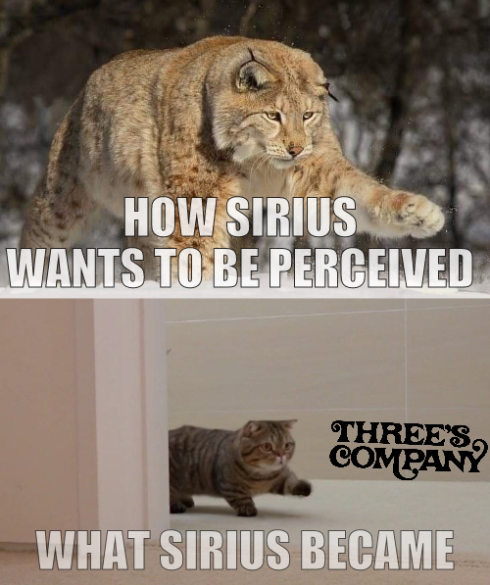Recognise the signs, leave before things escalate

Summary: Sirius ‘Open Source’ is trying to shut things down ‘on the cheap’; or so it would seem not just to an outsider but also to an insider, seeing the self-destructive behaviour
THE latest post was entitled “Symptoms of an Impending Bankruptcy?” because the company where I had worked for nearly 12 years was coming to an end. It’s partly the fault of one or two bitter managers. Their off-putting behaviour moreover destroyed staff morale. This is a common problem and it happens in other companies too.
Ultimately, staff leaves, clients leave, and there’s nothing left to salvage. They then refuse to pay departure fees (obligations to staff) and various bills too. They believe they can get away with this by hiding while humiliating people. We’ll say a lot more about this next month.
A lot of what we’re dealing with here isn’t entirely unique. Other companies in the sector follow similar models and it’s therefore important to recognise patterns.
The title of this post says “Successful Bankruptcy” because some business schools teach that as if the goal is bankruptcy, not saving or salvaging things, and “success” means screwing as many people/entities as possible in the process, passing costs, liabilities and deficits to them (those can be clients, suppliers, staff, lenders/banks, even relatives who were conned into becoming so-called ‘investors’ based on false promises or elusive prospects).
In the case of Sirius, the writings were on the wall for quite some time; the company meetings in recent years were dire and managers would never mention something like “Open Source”; yes, it was about money and nothing else!
Forget about software freedom, autonomy, and so on; the management doesn’t care! And this apathy is short-sighted as companies that forget what used to distinguish them simply won’t attract good workers. They cannot. I kept saying this in the meetings this year. How many people were hired this year? Zero. There wasn’t even an attempt to recruit anybody (as far as we’re aware).
We’ve meanwhile learned that other people have been having similar experiences in other companies. We heard one story last night in IRC, we received some E-mails in recent weeks, and we expect people to perhaps be inspired.
And behold, how timely, just three days ago in a FOSS blog on “the Gaslighting Weasel”: “My boss lied all of the time. Despite the fact that it was relatively easy to know they were lying, they didn’t care. If you called them out on it, they’d either ignore that, change the subject or somehow try to turn it back around on you. They didn’t just do this to me. They did it to everybody who works with them.”
This happened in Sirius too and colleagues were visibly resisting the lying. It irritated several colleagues.
How is a company supposed to be led by liars? We’re not talking about some habitual liar but a pathological one; it’s as if he has a book at the shelf behind him, with a title like “How to Lie Like a Boss!” (along with a rather smug reading list)
It’s hard to point out to pathological liars that they are liars. They’d simply not accept it. Instead, they resort to attacking the messenger/s. That’s why it is called “pathological”.
As a matter of fact, being a clever weasel, manipulating people and getting away with lies, ultimately dooms a sense of integrity in any organisation. Consider this article cited by the above post. It says: “People who engage in gaslighting are often habitual and pathological liars and frequently exhibit narcissistic tendencies. It is typical for them to blatantly lie and never back down or change their stories, even when you call them out or provide proof of their deception. [...] When you ask a someone who gaslights a question or call them out for something they did or said, they may change the subject by asking a question instead of responding to the issue at hand. This not only throws off your train of thought but causes you to question the need to press a matter when they don’t feel the need to respond. [...] A person who gaslights tends to retell stories in ways that are in their favor. For instance, if your partner shoved you against the wall and you are discussing it later, they may twist the story and say you stumbled and they tried to steady you, which is what caused you to fall into the wall.”
To be very clear, it wasn’t yours truly causing trouble. My actions were reactionary and the boss wasn’t happy. He got into this whole mess by repeatedly lying, and lying very badly. That’s why people started to call him “liar”; then he then used that to hunt down critics.
If one goes back to all the lying, it then becomes clear what the root issue is.
Here’s more from the blog above: “Meanwhile the ex-clients generally had very negative memories too. I know because I was still working with some of them on my own and we’d occasionally chat about the past. Of course now I realize that that my boss was painting themselves in a positive light. In every story they tell, they are the hero. There can be no other version of it. At least not in their deeply disturbed worldview.”
Sirius, as I said yesterday, has no chance of surviving. I know that as an insider. Expect it to fold soon. To make matters more difficult, a lot of the remaining company assets/money/resources are passed to Google and Amazon (AWS, gifts, ads) instead of where it can be more efficiently used/allocated. I pointed this out repeatedly, but that fell on deaf ears.
At Sirius what we’re now dealing with is two men who are not thinking straight, maybe due to andropause (not Andrew Boss or “Andrew, pause!”), with one of them showing up to a formal meeting in a rib shirt (not a step far from a shirtless Alex Jones). Geeks are basically being governed by a lying sociopath with a huge ego and overinflated sense of esteem, driving away our remaining clients by demolishing any remnants of trust (eventually they did find out they had been lied to).
Sirius may still seem like it’s doing OK, but it’s posturing at best. Maybe several more colleagues have left since my wife and I did; maybe the managers are not bothering to even update the site, knowing they might take it offline some time soon anyway, but the site still needs to be seen as healthy for existing (remaining) clients. As a reminder, the social control media accounts, notably Twitter, haven’t been active since this past summer (we showed evidence of this before). Maybe that’s the end of Sirius already. They just count the weeks/months.
From the report sent at the start of this month:
The current CEO’s role seems to be something along the lines of those “successful bankruptcy” they teach MBA students about, i.e. shutting a company down on the cheap (like looking for reasons to deny compensation). One might even joke that this CEO is like a “demolition man” for Sirius, spending time stalking staff instead of serving the company (Sirius lost Argo AI and other seemingly ‘fake’ clients whose systems Sirius never had access to; Argo AI is now formally and legally defunct), sawing the boat beneath him as at the end he too would be left without a job and Sirius as a company too become fiscally defunct.
It feels like Sirius is already so desperate for clients that it is willing to sign contracts at a humongous loss to Sirius. For instance, Sirius recently “miscalculated” with one client (charged 1,000 pounds for a project/client, but later realised Sirius already spent 5,000 pounds on the project, which means the losses are 4 times the revenue). In October the company changed the official company address to its accountancy’s address, i.e. the address of another firm. The day after Roy asked the CEO about it; he only got angry and it didn’t look good. We were running out of assets and maybe no postbox, either. Letters are sent to staff with no return address. Who runs the show? A private apartment?
Using Rianne for accusation by proxy seems irrational on many levels. It’s probably done just for spite and revenge against Roy. The letter sent to Rianne (by E-mail and then by post) is missing context and there are no URLs in screenshots. Without full context or at least a URL it’s almost impossible to know what one is looking at. Evidence oughtn’t be presented like this and IRC logs might not even be admissible in most contexts.






 Filed under:
Filed under: 

 Summary:
Summary: 

 ack in October
ack in October  HIS is too early, I know…
HIS is too early, I know…